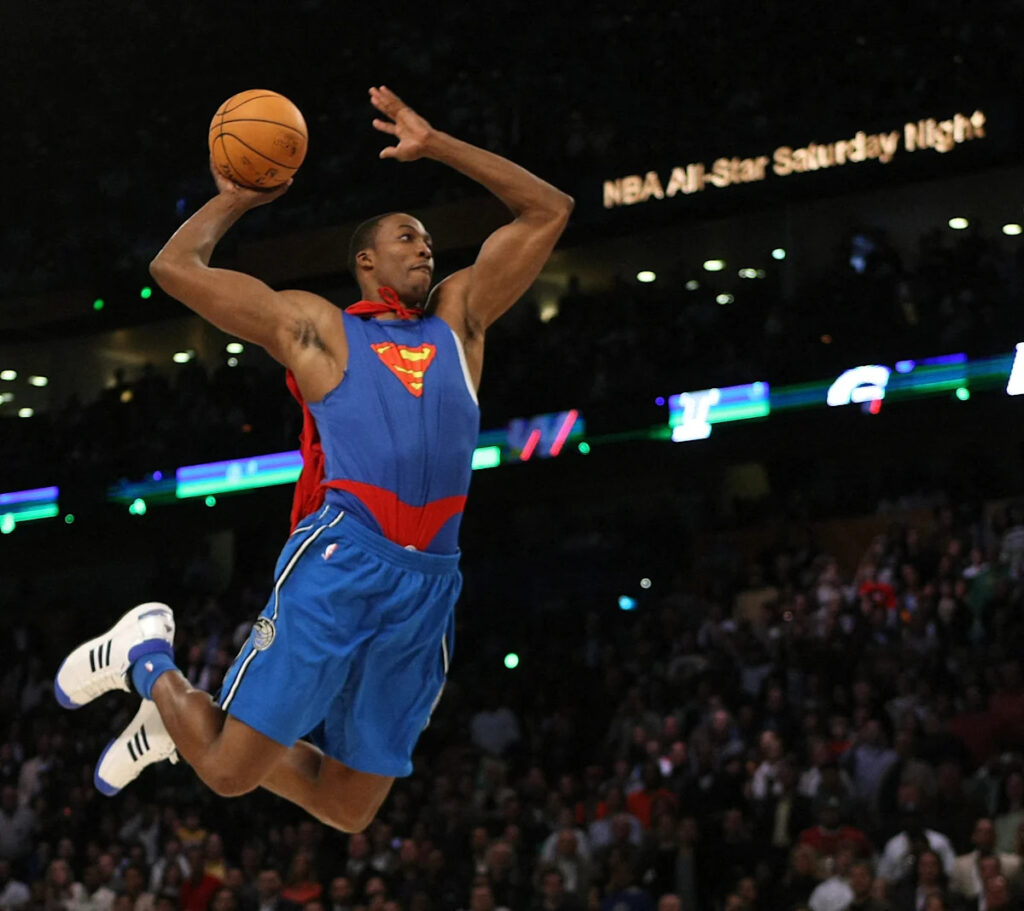Look at Dwight Howard as he stands to be inducted into basketball’s Hall of Fame in Springfield, Mass., on Saturday. His shoulders are cut from stone; the rest of his body follows suit. He seems like a 7-foot Superman, which is why he wore the Man of Steel’s cape for a dunk contest he won (as a center).
A handful of years into his career, we figured him for an all-timer. The NBA’s No. 1 overall draft pick in 2004, Howard was, at age 23, the league’s Defensive Player of the Year and a top-five MVP candidate. He appeared invincible and practically was, defeating prime LeBron James en route to the 2009 NBA Finals.
Advertisement
So, we measured him against the NBA’s untouchable centers — Bill Russell, Kareem Abdul-Jabbar, Wilt Chamberlain, Shaquille O’Neal, Hakeem Olajuwon and Moses Malone — for the remainder of his career.
[Join or create a Yahoo Fantasy Football league for the 2025 NFL season]
Howard never got there. He was the league’s most dominant big man for a five-year run in Orlando, where he first earned his reputation as an unserious superstar. Never was that more evident than in April 2012, amid trade request drama of Howard’s own making, when he awkwardly hugged Stan Van Gundy during an interview in which the coach was confirming the report that his star player wanted him fired.
That reputation followed him to Los Angeles, Houston, Atlanta, Charlotte and Washington, where along the way he stopped performing as an All-Star before his 30th birthday. He smiled when situations called for a scowl, and as a result he clashed with teammates, including Kobe Bryant and James Harden, who were unwilling to cede offensive control to a co-star whose leadership and skillset could not command it.
Dwight Howard was an eight-time All-Star, a three-time Defensive Player of the Year and, of course, an NBA slam dunk champion. (Photo by TIMOTHY A. CLARY/AFP via Getty Images)
(TIMOTHY A. CLARY via Getty Images)
“Dwight’s basketball IQ is not up to speed for him to be a dominant player,” Abdul-Jabbar once said.
Advertisement
O’Neal spoke worse of Howard, often, on national television. This is how harsh the criticism got.
Howard’s back bothered him, too, which seemed impossible the way he was built, but factor that into account as well. He missed 28 games of the 2011-12 campaign and required surgery to repair a herniated disk at season’s end. He was never the same. Bryant wasn’t willing to give him leniency on that, either.
(Howard’s 38.3 minutes per game from 2011-12 would have led the league last season. Remember that.)
Midway through his career the game was passing Howard by. He was a low-post player in an era defined by spacing. Following a trip to the 2015 Western Conference finals with Harden’s second-seeded Rockets, Howard played less and less for increasingly disappointing teams in increasingly depressing situations.
Advertisement
Then a funny thing happened. In deference to James — the prep-to-pro player who was drafted No. 1 in 2003 and another reason we expected so much from Howard — and Anthony Davis, Howard accepted a complementary role on the 2020 Lakers, even garnering some Sixth Man of the Year consideration, and they won a title together as a result. (He started opposite Nikola Jokić to close out the Denver Nuggets.)
Despite repeated attempts throughout his career to rebrand his image, Howard could never escape that air of immaturity. It is perhaps what led to Howard’s snubbing from the NBA 75, even though he is by far the highest-ranked player on our Bill Russell Scale not to be named among the 75 greatest players ever.
Advertisement
It bears repeating: At his peak Howard finished second in MVP voting and beat one of the game’s three greatest players ever in a best-of-seven playoff series. Not many people can claim that. It is through that lens — and not through our expectations for how a superstar should act — that we should view Howard on the eve of his induction into basketball’s Hall of Fame, an honor he surely deserves on the first ballot.
Dwight was not an all-time center on par with Russell, Kareem, Wilt, Shaq, Hakeem or Moses, but he belongs on any list of great bigs beyond them, among Patrick Ewing, David Robinson and the rest. Which is not such a bad place to be when you think of it. Measure Dwight Howard as he stands, a Hall of Famer.
Discover more from 6up.net
Subscribe to get the latest posts sent to your email.


